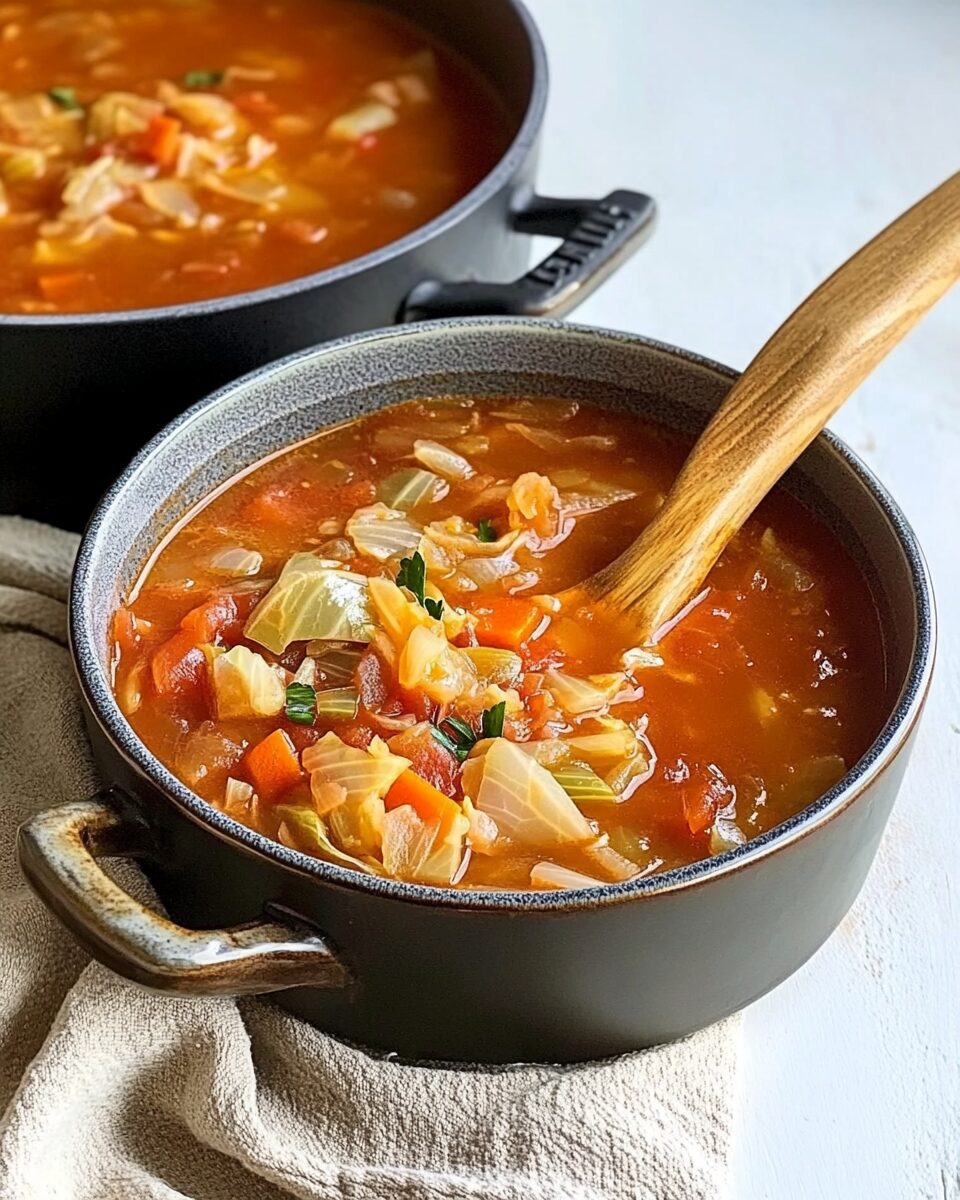Why This Recipe Works
What sets this cabbage soup apart is its clever layering of flavor and simplicity in preparation. It starts with a base of sautéed onions and garlic, enhanced with tomato paste and paprika for depth and warmth. The addition of crushed tomatoes and vegetable broth creates a rich, savory foundation, while cabbage and carrots add texture, sweetness, and bulk.
The key lies in the seasoning: apple cider vinegar and lemon juice provide brightness and acidity that cut through the natural sweetness of the vegetables and brown sugar. This balance of sweet and sour is not only traditional—it’s what keeps you coming back for spoonful after spoonful.
With only a single pot required and a relatively short simmer time, it’s also efficient. The ingredients are pantry staples, and the process is easy enough for novice cooks while yielding results that feel complex and well-developed.
Flavor and Texture Highlights
This soup is all about contrast. The green cabbage softens as it cooks, yet still retains some bite for a pleasing texture. The carrots contribute gentle sweetness and earthiness. Crushed tomatoes create a velvety, tangy broth that clings to the vegetables, enhanced by sweet paprika which adds a mild smokiness and depth.
The sweetness of brown sugar is not overpowering—it’s balanced by the acidity of the vinegar and lemon juice, which brighten the dish and bring complexity. Each spoonful carries the essence of home cooking: comforting, full-bodied, and slightly unexpected thanks to its unique sweet-sour profile.
Cultural and Historical Roots
Sweet and Sour Cabbage Soup, also known in some circles as Kapuśniak or Cabbage Borscht, has long been a staple in Eastern European Jewish kitchens, especially among Ukrainian and Polish communities. It was born out of necessity—cabbage was cheap, abundant, and long-lasting—and elevated by creativity and resourcefulness.
For Jewish families, this soup was a way to stretch ingredients and create a satisfying, meatless meal, especially during colder months or times of modest means. Over time, its sweet and sour profile became iconic, tied to cultural memory and holiday tables alike.
Today, it’s just as relevant for modern cooks seeking plant-based comfort food that’s deeply rooted in tradition and completely satisfying.
Nutritional Benefits
This soup may be comforting, but it’s also packed with nutrients. At just 137 calories per serving, it’s a low-calorie meal that doesn’t skimp on flavor or heartiness. With 6 grams of dietary fiber, it’s excellent for digestive health and fullness, and the 14 grams of natural sugars come from whole vegetables and a touch of brown sugar.
One serving offers:
Vitamin C: 61mg (303% DV), largely from cabbage and tomatoes
Potassium: 790mg (17% DV), which supports hydration and muscle function
Iron: 2mg (13% DV), important for energy and oxygen transport
Calcium: 124mg (10% DV), supporting bone health
4 grams of protein, which can be boosted further with toppings like beans, quinoa, or tofu
It’s naturally cholesterol-free, saturated-fat low, and completely vegan, making it suitable for a wide range of dietary lifestyles.
Tips for Best Results
Use fresh green cabbage for the best texture—don’t overcook it to mush. Shredding it thinly helps it cook evenly and gives the soup a more elegant appearance.
Start by sautéing the onion, garlic, and tomato paste until the paste darkens slightly and develops a richer flavor. This is a key step that enhances the overall depth of the broth.
Taste and adjust the balance of sweet and sour to your preference—some like it tangier (add more lemon or vinegar), others prefer a bit more sweetness (add an extra teaspoon of brown sugar).
For a richer broth, you can swap part of the water or broth with a splash of tomato juice or even a spoon of tomato purée.
Add a bay leaf early on and remove it before serving—it provides subtle herbal undertones that round out the soup.
Serving Suggestions
This soup can be a light lunch, a starter, or a comforting dinner on its own. Garnish with fresh parsley for brightness and cracked black pepper for contrast.
Serve it with:
A chunk of crusty bread or a warm roll
Potato latkes, knishes, or kasha on the side for a traditional pairing
A dollop of non-dairy sour cream or plain yogurt (if not keeping it vegan)
Add-ins like cooked barley, quinoa, or white beans to make it heartier
Chopped dill for a fresh, herbal twist
It’s also delicious served cold or at room temperature during warmer seasons—especially with an extra splash of lemon for a refreshing twist.
Make-Ahead and Storage Tips
This soup is ideal for meal prep and gets better with time as the flavors deepen. Store in an airtight container in the fridge for up to 5 days.
To freeze, let the soup cool completely and portion into freezer-safe containers or bags. It freezes well for up to 6 months. Thaw overnight in the fridge or reheat gently on the stovetop.
If planning to freeze, slightly undercook the cabbage so it retains more texture after reheating.
Why You’ll Love This Recipe
Sweet and Sour Cabbage Soup is hearty yet healthy, nostalgic yet refreshing. It brings warmth and brightness to any table, is simple to prepare, and offers a delicious way to eat more vegetables in winter.
Whether you grew up eating this or are discovering it for the first time, this soup delivers comfort and bold flavor without relying on meat, dairy, or complicated ingredients. It’s budget-friendly, freezer-friendly, and endlessly adaptable—a soup for every occasion and every eater.
Conclusion
Sweet and Sour Cabbage Soup is a celebration of old-world comfort and modern simplicity. With its rich tomato base, tender cabbage, and balanced sweet-tangy flavor, this vegan dish is proof that humble ingredients can make for the most satisfying meals. Perfect for cozy nights, holidays, or a soul-warming lunch, it’s a timeless recipe that will find a welcome place in your kitchen—again and again.






